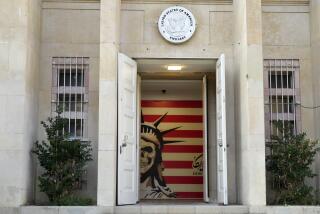After N.Y. shooting, Iranian rockers vow to keep the music going
- Share via
After a murder-suicide in Brooklyn earlier this week left four Iranian musicians dead, a series of questions remain. But now there’s one concrete answer: The show will go on.
In a statement issued Wednesday, the surviving members of the Iranian post-punk band known as the Yellow Dogs, which had moved to the U.S. in 2010 to avoid repression back home, vowed to “not let this disgusting brutality define us or become our story, but instead respond by creating music more passionately and with more intensity than ever before.”
Early Monday morning, a fellow Iranian musician, Ali Akbar Mohammadi Rafie, 29, of Queens, took a rifle to an apartment in East Williamsburg.
There, police said, he fatally shot an Iranian musician and writer, Ali Eskandarian, 35, and two brothers and Yellow Dogs members, Arash Farazmand, 28, and Soroush Farazmand, 27, before killing himself. A fifth man was also shot but survived.
The two surviving Yellow Dogs members were joined in their Wednesday statement by their manager, the Iranian street artists Icy and Sot, and Pooya Hosseini of the band Free Keys, another up-and-coming Iranian expat band in the U.S.
The men said that they had not had any contact with Rafie for 14 months after cutting off a strained relationship. Rafie had joined the Free Keysafter the band’s bassist had trouble securing a visa.
“By the third show in May 2012, Free Keys decided to stop working with Rafi as a result of personal and musical differences,” the members said in their statement. “It became clear very quickly that he was not a natural fit within our group of friends, and his personal views conflicted with our approach to our art and to the world.”
The Yellow Dogs were regarded with respect not only in Brooklyn, but back home in Tehran, where the deaths were mourned by the underground rock scene where the musicians had first hammered their rebellious sound into shape.
Before coming to the U.S., the aspiring rockers had gained the attention of the U.S. State Department, which, in a 2009 diplomatic cable released by WikiLeaks, referred to the young men as “The Ayatollahs of Rock and Rolla.”
Although they lived in a cosmopolitan Tehran where “Oprah” and “Guitar Hero” were popular among the liberal youth, the band’s members bemoaned religious conservatives who had “never used a computer, never watched a foreign film, and never heard of the Beatles.”
The rockers’ move to the U.S. to escape repression was a history that still hung over the band’s surviving members, who noted that Arash Farazmand had just received asylum in the U.S. and that Soroush Farazmand was working on new music. Askandrian was reportedly almost finished with a memoir.
The surviving musicians promised to continue playing in spite of the tragedy and by “embracing the freedom that we all dreamed would one day be ours back in Iran and play to honor those who should be playing next to us.”
The band said it was planning a benefit to raise money to recover from the tragedy, with donations accepted at www.neverheardinc.com/donate.
ALSO:
Whitey Bulger likened to Satan by victim’s son
Killer whales: Court weighs lifting ban on trainer-orca contact
Ryan Ferguson a free man after newspaper murder case collapses
More to Read
Sign up for Essential California
The most important California stories and recommendations in your inbox every morning.
You may occasionally receive promotional content from the Los Angeles Times.











